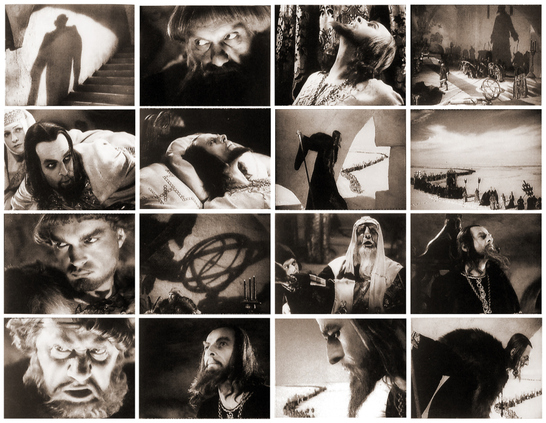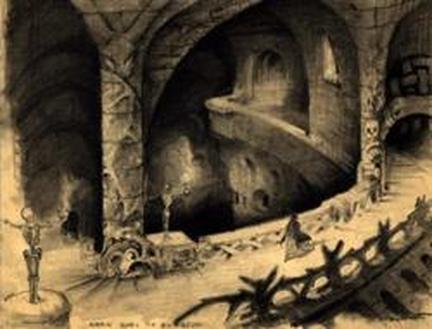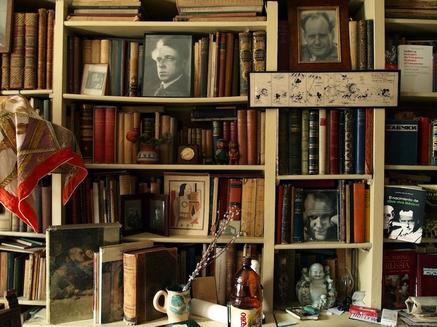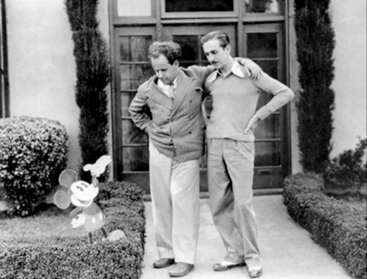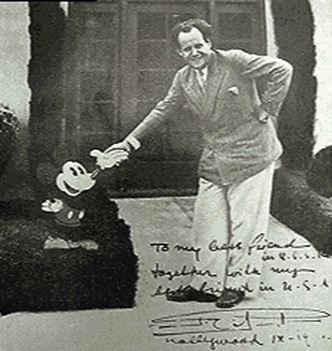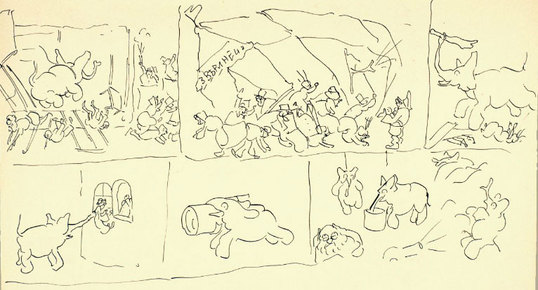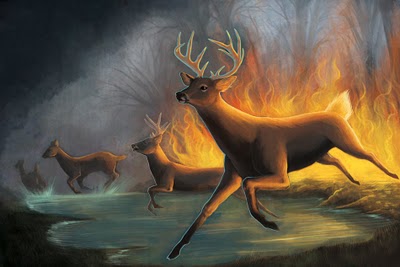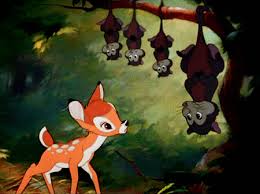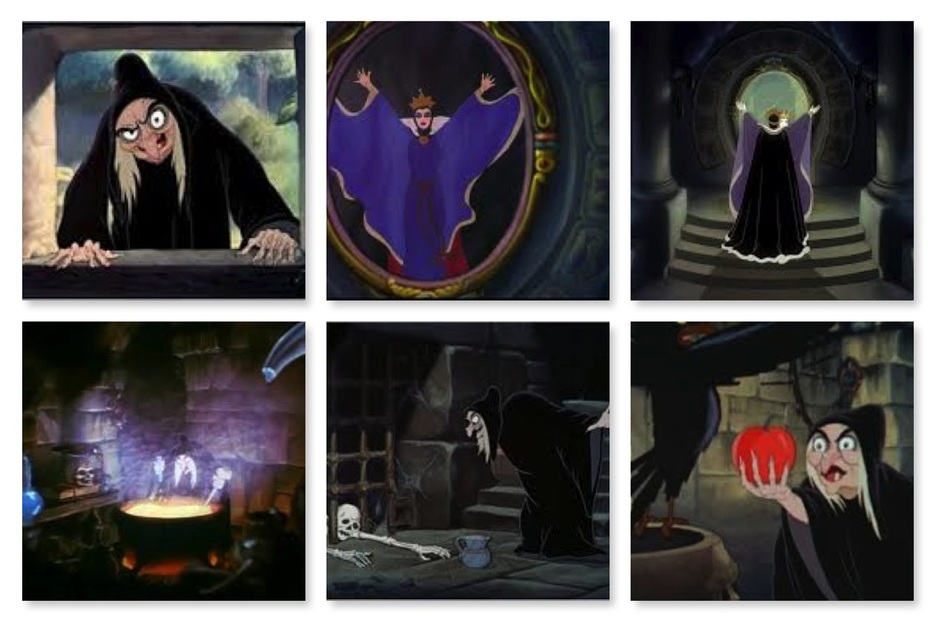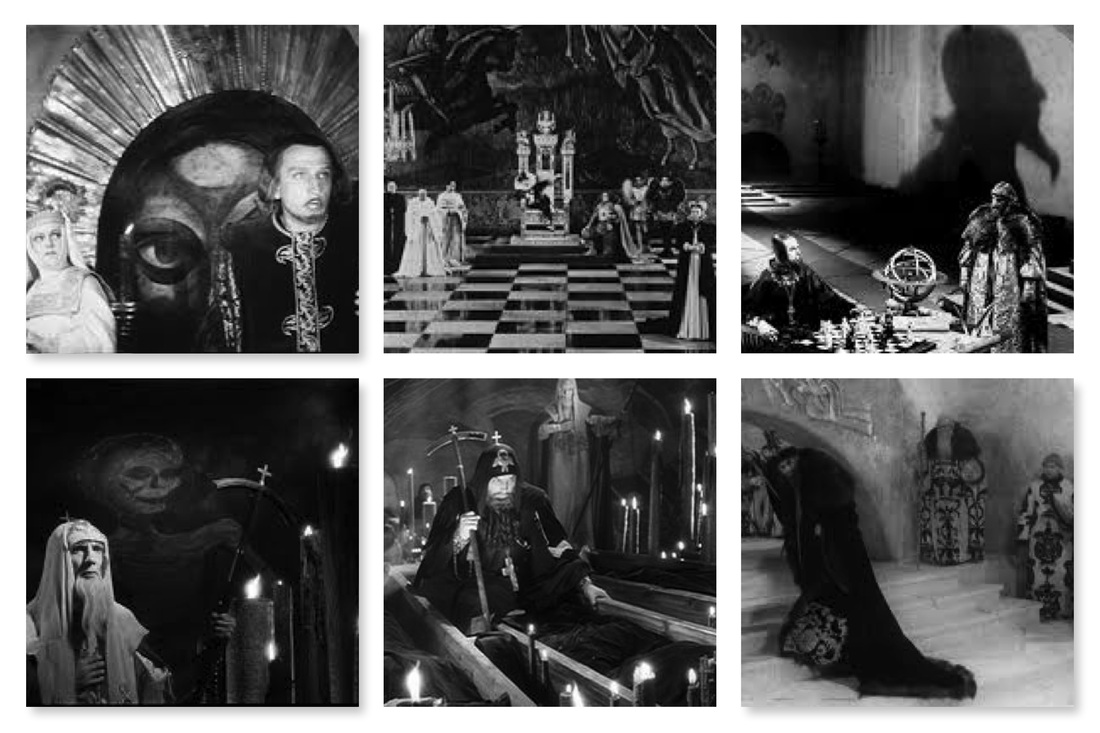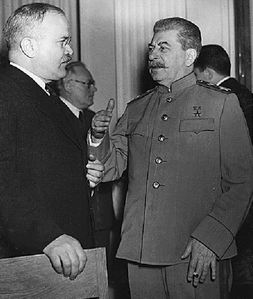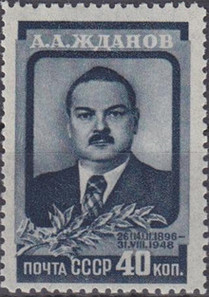Stalin, Eisenstein, Walt Disney and Ivan the Terrible
(above image shows part of sketch Disney gave to Eisenstein which the director kept in his apartment after returning to the USSR )
The significance of Ivan the Terrible
|
Eisenstein's last, epic and incomplete venture into movie-making was his attempted trilogy about the life of the psychopathic medieval Russian ruler known as Ivan the Terrible. Part one (1944) met with Stalin's warm approval, but the dictator was deeply offended by Part Two , with its depictions of a demented ruler, secret police and conspiracies and dissension. It was never allowed to be screened until several years after Stalin's death. Eisenstein had filmed a few scenes for his intended third episode, but the project was halted, footage destroyed and the director forced to apologise for his cultural and ideological misdeeds. He had to declare that his film was "ideologically defective" and that it did not "serve socialism", the Communist Party's declared object of all art forms. Within a few months Eisenstein was dead of a heart attack.
Some film historians believe that Eisenstein had not anticipated Stalin's favorable response to Part One, and was determined in Part Two to go over the top in order to make obvious the parallels between the mad medieval tyrant and his reign of fear, and the rule of Stalin. Hence the operatic, surrealistic and nightmarish aspects of the movie. Stalin certainly got Eisenstein's message. He and his top cultural overseers saw the movie as representative of dangerous trends in the Soviet film industry and indeed postwar Soviet culture and society in general. Recently released archives include documents showing just how Stalin personally dealt with Eisenstein. (below) |
Walt Disney's influence on Eisenstein
|
|
For decades most Western intellectuals with an interest in cinema (generally regarded by academics as an inferior art-form) praised the movies of Eisenstein as daring and innovative , while rejecting the animated work of his near-contemporary Walt Disney as puerile, commercial and superficial. But the Russian director idolised the movies of Disney, whose style and technique can be seen especially clearly in Part Two of Ivan the Terrible, for which Snow White and the Seven Dwarves served as inspiration for some of its imagery.
In the early 1930s when Eisenstein visited Hollywood he became friends with Disney, whose work he continued to admire until his death. Disney, the Russian believed, "achieves absolute perfrection in what he does." As the images on left show, the two directors got on very well. Eisenstein praised Disney's work for several reasons. One of the most interesting was ideologically dangerous for the director. The official Communist party line (echoed by many intellectuals in the West) condemned Disney for providing the undiscerning masses with cultural comfort food that distracted them from the oppressions of capitalism. But Eisenstein rejoiced in Disney's ability to give pleasure and laughter to his audiences, which he believed helped them cope with the effects of the great depression. On another, aesthetic and complicated level, Eisenstein praised the artistic and cinematic qualities of Disney's animation techniques. He insisted that it enabled a more versatile, daring cinema, one in which transformations of shape and style could occur. So the Russian lauded Bambi as offering "a shift towards ecstasy" which represented "the greatness of Disney as the purest example of the application of the method of art in its very purest form." For Eisenstein, "Walt Disney's work is the most omni-appealing I've ever met.... The very idea ... of asn animated cartoon is practically a direct manifestation of the method of animism. In this way, what Disney does is connected with one of the deepest features of the human psyche."In Eisenstein's now famous but difficult essay on Disney, published some years after his death, he praises what he calls the "plasmaticity" of Disney-style animation, with its ability to "take on any form dynamically". He places Disney's work alongside cave painting, the art of Leonardo, the literature of Shakepeare and Dostoevsky and the ideas of Hegel and Darwin. So decades before |
In their own words: Stalin & his cultural commissars on movies and Eisenstein
Some of the most interesting and revealing of the Soviet-era files that have now become available reveal how Stalin and the party leadership were determined to exert complete control over Russian movies and their makers.This was part of a campaign orchestrated by Andrey Zhdanov, an important Minister tasked by Stalin with the job of So we now know that in February 1947 the Party leadership decided to purge what it claimed to be serious flaws in the ideological and political content of Soviet culture and to "improve" its artistic content. Five months earlier the elite Central Committee had condemned the movie Glowing Life. Ominously for Eisenstein, Its criticisms extended to Part II of Ivan the Terrible:
'The fact of the matter is that many of our leading cinema workers - producers, directors and scenario writers - are taking a lighthearted and irresponsible attitude to their duties and are not working conscientiously on the films they produce. The chief defect in their work is failure to study subject matter... Producer Eisenstein betrayed ignorance of historical facts in the second series of Ivan Grozny, depicting Ivan Grozny's progressive army, the oprichniki, as a gang of degenerates reminiscent of the American Ku Klux Klan. Ivan Grozny, a man of strong will and character, is shown as a spineless weakling, as a Hamlet type...
In what became literally a death sentence for some bureaucrats and film-makers in the Soviet film industry, the Committee deplored "the production of worthless films " that displayed "lack of knowledge of subject matter and the lighthearted attitude of scenario writers and producers to their work." Extending the scope of its warning, the Committee declared 'Art workers must realise that those who continue to take an irresponsible, lighthearted attitude to their work, may well find themselves superfluous and outside the ranks of progressive Soviet art, for the cultural requirements and demands of the Soviet theatregoer have developed and the Party and Government will continue to cultivate among the people good taste and encourage exacting demands on works of art.'
[citations from Decisions of the Central Committee, C.P.S.U.(b) On Literature and Art (]946-1948), Moscow, 1951, pp. 26-28.)
'The fact of the matter is that many of our leading cinema workers - producers, directors and scenario writers - are taking a lighthearted and irresponsible attitude to their duties and are not working conscientiously on the films they produce. The chief defect in their work is failure to study subject matter... Producer Eisenstein betrayed ignorance of historical facts in the second series of Ivan Grozny, depicting Ivan Grozny's progressive army, the oprichniki, as a gang of degenerates reminiscent of the American Ku Klux Klan. Ivan Grozny, a man of strong will and character, is shown as a spineless weakling, as a Hamlet type...
In what became literally a death sentence for some bureaucrats and film-makers in the Soviet film industry, the Committee deplored "the production of worthless films " that displayed "lack of knowledge of subject matter and the lighthearted attitude of scenario writers and producers to their work." Extending the scope of its warning, the Committee declared 'Art workers must realise that those who continue to take an irresponsible, lighthearted attitude to their work, may well find themselves superfluous and outside the ranks of progressive Soviet art, for the cultural requirements and demands of the Soviet theatregoer have developed and the Party and Government will continue to cultivate among the people good taste and encourage exacting demands on works of art.'
[citations from Decisions of the Central Committee, C.P.S.U.(b) On Literature and Art (]946-1948), Moscow, 1951, pp. 26-28.)
The transcript below of a session in the Kremlin to which Eisenstein was "invited" in invaluable in showing Stalin's cool, commanding and ruthless personality and his insistence that the party exert detailed control over all aspects of Soviet movie culture.
We were summoned to the Kremlin at about 11 o'clock [In the evening - Ed.]. At 10.50 we reached the reception. Exactly at 11 o'clock Poskrebyshev came out to escort us to the cabinet.
At the back of the room were Stalin, Molotov and Zhdanov.
We entered, exchanged greetings and sat around the table.
Stalin. You wrote a letter. The answer got delayed a little. We are meeting late. I first thought of giving a written answer but then I decided that talking will be better. As I am very busy and have no time I decided to meet you here after a long interval. I received your letter in November.
Zhdanov. You received it while stilI in Sochi.
Stalin. Yes, yes. In Sochi. What have you decided to do with the film?
We are saying that we have divided the second part of the film into two sections, because of which the Livonsky March has not been included. As a result there is a disproportion between the different parts of the film. So it is necessary to correct the film by editing the existing material and to shoot mainly the Livonsky march.
Stalin. Have you studied History?
Eisenstein. More or less.
Stalin. More or less? I am also a little familiar with history. You have shown the oprichnina incorrectly. The oprichnina was the army of the king. It was different from the feudal army which could remove its banner and leave the battleground at any moment - the regular army, the progressive army was formed. You have shown thisoprichnina to be like the Ku-Klux-Klan.
Eisenstein said that they wear white cowls but we have black ones.
Molotov. This does not make a major difference.
Stalin. Your tsar has come out as being indecisive, he resembles Hamlet. Everybody prompts him as to what is to be done, and he himself does not take any decision... Tsar Ivan was a great and a wise ruler, and if he is compared with Ludwig XI (you have read about Ludwig XI who prepared absolutism for Ludwig XIV), then Ivan the Terrible is in the tenth heaven. The wisdom of Ivan the Terrible is reflected by the following: he looked at things from the national point of view and did not allow foreigners into his country, he barricaded the country from the entry of foreign influence. By showing Ivan the Terrible in this manner you have committed a deviation and a mistake. Peter Ist was also a great ruler, but he was extremely liberal towards foreigners, he opened the gate wide to them and allowed foreign influence into the country and permitted the Germanisation of Russia. Catherine allowed it even more. And further. Was the court of Alexander I really a Russian court? Was the Court of Nicolaus I a Russian court? No, they were German courts.
The most outstanding contribution of Ivan the Terrible was that he was the first to introduce the government monopoly of external trade. Ivan the Terrible was the first and Lenin was the second.
Zhdanov. The Ivan the Terrible of Eisenstein came out as a neurotic.
Molotov. In general, emphasis was given to psychologism, excessive stress was laid on internal psychological contradictions and personal emotions.
Stalin. It is necessary to show the historical figure in correct style. For example it was not correct that in the first series Ivan the Terrible kissed his wife so long. At that period it was not permitted.
Zhdanov. The film is made in the Byzantine style but there also it was not done.
Molotov. The second series is very restricted in domes and vaults, there is no fresh air, no wider Moscow, it does not show the people. One may show conversations, repressions but not this.
Stalin. Ivan the Terrible was extremely cruel. It is possible to show why he had to be cruel.
One of the mistakes of Ivan the Terrible was that he did not completely finish off the five big feudal families. If he had destroyed these five families then there would not have been the Time of Troubles. If Ivan the Terrible executed someone then he repented and prayed for a long time. God disturbed him on these matters... It was necessary to be decisive.
Molotov. It is necessary to show historical incidents in a comprehensive way. For example the incident with the drama of Demyan Bedny Bogatyp. Demyan Bedny mocked the baptism of Russia, but in reality acceptance of Christianity was a progressive event for its historical development.
Stalin. Of course, we are not good Christians but to deny the progressive role of Christianity at that particular stage is impossible. This incident had a very great importance because this turned the Russian state to contacts with the West, and not to an orientation towards the East.
About relations with the East, Stalin said that after the recent liberation from the Tatar yoke, Ivan the Terrible united Russia in a hurried way so as to have a stronghold to face a fresh Tatar attack. Astrakhan was already conquered and they could have attacked Moscow at any moment, The Crimean Tatars also could have done this.
Stalin. Demyan Bedny did not have the correct historical perspective. When we shifted the statue of Minin and Podzharsky closer to the church of Vasily Blazhenova then Demyan Bedny protested and wrote that the statue must be thrown away and that Minin and Podzharsky must be forgotten. In answer to this letter, I called him 'Ivan, do not forget your own family'. We cannot throw away history...'
Next Stalin made a series of remarks regarding the interpretation of Ivan the Terrible and said that Malyuta Skuratov was a great army general and died a hero's death in the war with Livonia.
Cherkasov in reply said that criticism always helped and that after criticism Pudovkin made a good film Admiral Nakhimov. 'We are sure that we will not do worse. I am working on the character of Ivan the Terrible not only the film, but also in the theatre. I fell in love with this character and think that our alteration of the scenes will be correct and truthful'.
In response to this Stalin replied (addressing Molotov and Zhdanov) - 'Let's try?'
Cherkasov I am sure that the alteration will be successful.
Stalin. May god help you, - every day a new year. (Laughs.)
Eisenstein. We are saying that in the first part a number of moments were successful and this gives us the confidence for making the second series.
Stalin. We are not talking about what you have achieved, but now we are talking about the shortcomings.
Eisenstein asked whether there were some more instructions regarding the film.
Stalin. I am not giving you instructions but expressing the viewer's opinion. It is necessary that historical characters are reflected correctly. What did Glinka show us? What is this Glinka. This is Maksim and not Glinka. [They were talking about the film Composer Glinka made by L. Arnshtam. The main role was played by B. Chirkov.] Artist Chirkov could not express himself and for an artist the greatest quality is the capability to transform himself. (Addressing Cherkasov) - you are capable of transforming yourself.
In answer to this Zhdanov said that Cherkasov was unlucky with Ivan the Terrible. There was still panic with regard to Spring and he started to act as a janitor - in the filmIn the Name of Life he plays a janitor.
Cherkasov said that he had acted the maximum number of tsars and he had even acted as Peter Ist and Aleksei.
Zhdanov. According to the hereditary line. He proceeded according to the hereditary line.
Stalin. It is necessary to show historical figures correctly and strongly. (To Eisenstein). You directed Alexander Nevsky. It came out very well. The most important thing is to maintain the style of the historical period. The director may deviate from history; it is not correct if he simply copies from the historical materials, he must work on his ideas but within the boundary of style. The director may vary within the style of that historical period.
Zhdanov said that Eisenstein is fascinated by the shadows (which distracts viewers from the action), and the beard of Ivan the Terrible and that Ivan the Terrible raises his head too often, so that his beard can be seen.
Eisenstein promised to shorten the beard of Ivan the Terrible in future.
Stalin. (Recalling different actors from the first part of the film Ivan the Terrible) Kurbsky - is magnificent. Staritsky is very good (Artist Kadochnikov). He catches the flies excellently. Also: the future tsar, he is catching flies with his hands! These type of details are necessary. They reveal the essence of man.
...The conversation then switched to the situation in Czechoslovakia in connection with Cherkasov's participation in the Soviet film festival. Cherkasov narrated the popularity of the Soviet Union in Czechoslovakia.
The discussion then touched upon the destruction of the Czechoslovakian cities by the Americans.
Stalin. Our job was to enter Prague before the Americans. The Americans were in a great hurry, but owing to Koniev's attack we were able to outdistance the Americans and strike Prague just before its fall. The Americans bombed Czechoslovakian industry. They maintained this policy throughout Europe, for them it was important to destroy those industries which were in competition with them. They bombed with taste.
Cherkasov spoke about the album of photographs of Franco and Goebbels which was with Ambassador Zorin at his villa.
Stalin. It is good that we finished these pigs. It is horrifying to think what would have happened if these scoundrels had won.
Cherkasov mentioned the graduation ceremony of the Soviet colony in Prague. He spoke of the children of emigrants who were studying there. It was very sad for these children who think of Russia as their motherland, as their home, when they were born there and had never been to Russia.
Stalin. It is unfortunate for these children. They are not at fault.
Molotov. Now we are giving a big opportunity to the children to return to Russia.
Stalin pointed to Cherkasov that he had the capacity for incarnation and that we have still the capacity to incarnate the artist Khmelev.
Cherkasov said that he had learnt a lot while working as an extra in the Marine Theatre in Leningrad. At that time the great master of incarnation Shaliapin acted and appeared on stage.
Stalin. He was a great actor.
Zhdanov asked: how is the shooting of the film Spring going on.
Cherkasov. We will finish it soon. Towards spring we are going to release Spring.
Zhdanov said that he liked the content of Spring a lot. The artist Orlova played very well.
Cherkasov. The artist Plyatt acted very well.
Zhdanov. And how did Ranevskaya act! (Waves his hand.)
Cherkasov. For the first time in my life I appeared in a film without a beard, without a moustache, without a cloak, without make-up. Playing the role of a director, I am a bit ashamed of my appearance and I feel like hiding behind my characters. This role is a lot of responsibility because I must represent a Soviet director and all our directors are worried: How will a Soviet director be shown?
Molotov. And here Cherkasov is settling scores with all the directors! When the film Spring was called into question, Cherkasov read an editorial in the newspaper Soviet Art regarding Spring and decided the film was already banned. And then Zhdanov said: Cherkasov saw that all the preparations for Spring had perished so he took on the role of a janitor. Then Zhdanov spoke disapproving of the critical storm which had come up around Spring.
Stalin was interested to know how the actress Orlova had acted. He approved of her as an actress.
Cherkasov said that this actress had a great capability of working and an immense talent.
Zhdanov. Orlova acted extremely well. And everybody remembered Volga-Volga and the role of the postman Orlova had played.
Cherkasov. Have you watched In the Name of Life?
Stalin. No, I have not watched it, but we have a good report from Kliment Efremovich. Voroshilov liked the film.
Then that means that all the questions are solved. What do you think Comrades (addresses Molotov and Zhdanov), should we give Comrades Cherkasov and Eisenstein the opportunity to complete the film? - and added - please convey all this to Comrade Bolshakov.
Cherkasov asked about some details in the film and about the outward appearance of Ivan the Terrible.
Stalin. His appearance is right, there is no need to change it. The outward appearance of Ivan the Terrible is fine.
Cherkasov. Can the scene about the murder of Staritskova be retained in the scenario?
Stalin. You may retain it. The murder did take place.
Cherkasov. We have a scene in which Malyuta Skuratov strangles the Metropolit Philip.
Zhdanov. It was in the Tver Otroch-Monastery?
Cherkasov. Yes, is it necessary to keep this scene? Stalin said that it was necessary to retain this scene as it was historically correct.
Molotov said it was necessary to show repression but at the same time one must show the purposes for which it was done. For this it was necessary to show state activities on a wider canvas and not to immerse oneself only with the scenes in the basements and enclosed areas. One must show wide state activity.
Cherkasov expressed his ideas regarding the future of the altered scenes and the second series.
Stalin. How does the film end? How better to do this, to make another two films - that is second and third series. How are we planning to this?
Eisenstein said that it was better to combine the already shot material of the second series with what was left of the scenario - and produce one big film.
Everyone agreed to this.
Stalin. How is your film going to end?
Cherkasov said that the film would end with the defeat of Livonia, the tragic death of Malyuta Skuratov, the march towards the sea where Ivan the Terrible is standing, surrounded by the army, and says, 'We are standing on the sea and will be standing!'
Stalin. This is how it turned out and a bit more than this.
Cherkasov asked whether it would be necessary to show the outline of the film for confirmation by the Politburo.
Stalin. It is not necessary to present the scenario, decide it by yourselves. It is generally difficult to judge from the scenario, it is easier to talk about a ready product. (To Molotov.) You must be wanting to read the scenario?
Molotov. No, I work in other fields. Let Bolshakov read it.
Eisenstein said that it was better not to hurry with the production of this film.
This comment drew an active reaction from everybody.
Stalin. It is absolutely necessary not to hurry, and in general to hasten the film would lead to its being shut down rather than its being released. Repin worked on theZaporozhye Cossacks Writing Their Reply to the Turkish Sultan for 11 years.
Molotov. 13 years.
Stalin (with insistence) 11 years.
Everybody came to the conclusion that only a long spell of work may in reality produce a good film.
Regarding the film Ivan the Terrible Stalin said - That if necessary take one and a half, two even three years to produce this film. But the film should be good, it should be 'sculptured'. We must raise quality. Let there be fewer films, but with greater quality. The viewer has grown up and we must show him good productions.
It was discussed that Tselikovskaya acted well in other characters, she acts well but she is a ballerina.
We answered that it was impossible to summon another actress to Alma-Ata.
Stalin said that the directors should be adamant and demand whatever they need. But our directors too easily yield on their own demands. It sometimes happens that a great actor is necessary but it is played by someone who does not suit the role. This is because the actor demands and receives the role while the director agrees.
Eisenstein. The actress Gosheva could not be released from the Arts Theatre in Alma-Ata for the shooting. We searched two years for an Anastasia.
Stalin. Artist Zharov incorrectly looked upon his character without any seriousness in the film Ivan the Terrible. He is not a serious Army-General.
Zhdanov. This is not Malyuta Skuratov but an opera-hat.
Stalin. Ivan the Terrible was a more nationalist tsar, more foresighted, he did not allow foreign influence in Russia. Peter Ist opened the gate to Europe and allowed in too many foreigners.
Cherkasov said that it was unfortunate and a personal shame that he had not seen the second part of the film Ivan the Terrible. When the film was edited and shown he had been at that time in Leningrad.
Eisenstein also added that he had not seen the complete version of the film because he had fallen ill after completing it.
This caused great surprise and animation.
The discussion ended with Stalin wishing them success and saying 'May god help them!'
They shook hands and left. At 00.10 minutes the conversation ended.
An addition was made to this report by Eisenstein and Cherkasov:
'Zhdanov also said: 'In the film there is too much over-indulgence of religious rituals.'
Translated from the Russian by Sumana Jha.
Courtesy: G. Maryamov: Kremlevskii Tsenzor, Moscow, 1992, pp. 84-91.
J.V. Stalin: The Discussion with Sergei Eisenstein on the Film Ivan the Terrible
http://revolutionarydemocracy.org/rdv3n2/ivant.htm
We were summoned to the Kremlin at about 11 o'clock [In the evening - Ed.]. At 10.50 we reached the reception. Exactly at 11 o'clock Poskrebyshev came out to escort us to the cabinet.
At the back of the room were Stalin, Molotov and Zhdanov.
We entered, exchanged greetings and sat around the table.
Stalin. You wrote a letter. The answer got delayed a little. We are meeting late. I first thought of giving a written answer but then I decided that talking will be better. As I am very busy and have no time I decided to meet you here after a long interval. I received your letter in November.
Zhdanov. You received it while stilI in Sochi.
Stalin. Yes, yes. In Sochi. What have you decided to do with the film?
We are saying that we have divided the second part of the film into two sections, because of which the Livonsky March has not been included. As a result there is a disproportion between the different parts of the film. So it is necessary to correct the film by editing the existing material and to shoot mainly the Livonsky march.
Stalin. Have you studied History?
Eisenstein. More or less.
Stalin. More or less? I am also a little familiar with history. You have shown the oprichnina incorrectly. The oprichnina was the army of the king. It was different from the feudal army which could remove its banner and leave the battleground at any moment - the regular army, the progressive army was formed. You have shown thisoprichnina to be like the Ku-Klux-Klan.
Eisenstein said that they wear white cowls but we have black ones.
Molotov. This does not make a major difference.
Stalin. Your tsar has come out as being indecisive, he resembles Hamlet. Everybody prompts him as to what is to be done, and he himself does not take any decision... Tsar Ivan was a great and a wise ruler, and if he is compared with Ludwig XI (you have read about Ludwig XI who prepared absolutism for Ludwig XIV), then Ivan the Terrible is in the tenth heaven. The wisdom of Ivan the Terrible is reflected by the following: he looked at things from the national point of view and did not allow foreigners into his country, he barricaded the country from the entry of foreign influence. By showing Ivan the Terrible in this manner you have committed a deviation and a mistake. Peter Ist was also a great ruler, but he was extremely liberal towards foreigners, he opened the gate wide to them and allowed foreign influence into the country and permitted the Germanisation of Russia. Catherine allowed it even more. And further. Was the court of Alexander I really a Russian court? Was the Court of Nicolaus I a Russian court? No, they were German courts.
The most outstanding contribution of Ivan the Terrible was that he was the first to introduce the government monopoly of external trade. Ivan the Terrible was the first and Lenin was the second.
Zhdanov. The Ivan the Terrible of Eisenstein came out as a neurotic.
Molotov. In general, emphasis was given to psychologism, excessive stress was laid on internal psychological contradictions and personal emotions.
Stalin. It is necessary to show the historical figure in correct style. For example it was not correct that in the first series Ivan the Terrible kissed his wife so long. At that period it was not permitted.
Zhdanov. The film is made in the Byzantine style but there also it was not done.
Molotov. The second series is very restricted in domes and vaults, there is no fresh air, no wider Moscow, it does not show the people. One may show conversations, repressions but not this.
Stalin. Ivan the Terrible was extremely cruel. It is possible to show why he had to be cruel.
One of the mistakes of Ivan the Terrible was that he did not completely finish off the five big feudal families. If he had destroyed these five families then there would not have been the Time of Troubles. If Ivan the Terrible executed someone then he repented and prayed for a long time. God disturbed him on these matters... It was necessary to be decisive.
Molotov. It is necessary to show historical incidents in a comprehensive way. For example the incident with the drama of Demyan Bedny Bogatyp. Demyan Bedny mocked the baptism of Russia, but in reality acceptance of Christianity was a progressive event for its historical development.
Stalin. Of course, we are not good Christians but to deny the progressive role of Christianity at that particular stage is impossible. This incident had a very great importance because this turned the Russian state to contacts with the West, and not to an orientation towards the East.
About relations with the East, Stalin said that after the recent liberation from the Tatar yoke, Ivan the Terrible united Russia in a hurried way so as to have a stronghold to face a fresh Tatar attack. Astrakhan was already conquered and they could have attacked Moscow at any moment, The Crimean Tatars also could have done this.
Stalin. Demyan Bedny did not have the correct historical perspective. When we shifted the statue of Minin and Podzharsky closer to the church of Vasily Blazhenova then Demyan Bedny protested and wrote that the statue must be thrown away and that Minin and Podzharsky must be forgotten. In answer to this letter, I called him 'Ivan, do not forget your own family'. We cannot throw away history...'
Next Stalin made a series of remarks regarding the interpretation of Ivan the Terrible and said that Malyuta Skuratov was a great army general and died a hero's death in the war with Livonia.
Cherkasov in reply said that criticism always helped and that after criticism Pudovkin made a good film Admiral Nakhimov. 'We are sure that we will not do worse. I am working on the character of Ivan the Terrible not only the film, but also in the theatre. I fell in love with this character and think that our alteration of the scenes will be correct and truthful'.
In response to this Stalin replied (addressing Molotov and Zhdanov) - 'Let's try?'
Cherkasov I am sure that the alteration will be successful.
Stalin. May god help you, - every day a new year. (Laughs.)
Eisenstein. We are saying that in the first part a number of moments were successful and this gives us the confidence for making the second series.
Stalin. We are not talking about what you have achieved, but now we are talking about the shortcomings.
Eisenstein asked whether there were some more instructions regarding the film.
Stalin. I am not giving you instructions but expressing the viewer's opinion. It is necessary that historical characters are reflected correctly. What did Glinka show us? What is this Glinka. This is Maksim and not Glinka. [They were talking about the film Composer Glinka made by L. Arnshtam. The main role was played by B. Chirkov.] Artist Chirkov could not express himself and for an artist the greatest quality is the capability to transform himself. (Addressing Cherkasov) - you are capable of transforming yourself.
In answer to this Zhdanov said that Cherkasov was unlucky with Ivan the Terrible. There was still panic with regard to Spring and he started to act as a janitor - in the filmIn the Name of Life he plays a janitor.
Cherkasov said that he had acted the maximum number of tsars and he had even acted as Peter Ist and Aleksei.
Zhdanov. According to the hereditary line. He proceeded according to the hereditary line.
Stalin. It is necessary to show historical figures correctly and strongly. (To Eisenstein). You directed Alexander Nevsky. It came out very well. The most important thing is to maintain the style of the historical period. The director may deviate from history; it is not correct if he simply copies from the historical materials, he must work on his ideas but within the boundary of style. The director may vary within the style of that historical period.
Zhdanov said that Eisenstein is fascinated by the shadows (which distracts viewers from the action), and the beard of Ivan the Terrible and that Ivan the Terrible raises his head too often, so that his beard can be seen.
Eisenstein promised to shorten the beard of Ivan the Terrible in future.
Stalin. (Recalling different actors from the first part of the film Ivan the Terrible) Kurbsky - is magnificent. Staritsky is very good (Artist Kadochnikov). He catches the flies excellently. Also: the future tsar, he is catching flies with his hands! These type of details are necessary. They reveal the essence of man.
...The conversation then switched to the situation in Czechoslovakia in connection with Cherkasov's participation in the Soviet film festival. Cherkasov narrated the popularity of the Soviet Union in Czechoslovakia.
The discussion then touched upon the destruction of the Czechoslovakian cities by the Americans.
Stalin. Our job was to enter Prague before the Americans. The Americans were in a great hurry, but owing to Koniev's attack we were able to outdistance the Americans and strike Prague just before its fall. The Americans bombed Czechoslovakian industry. They maintained this policy throughout Europe, for them it was important to destroy those industries which were in competition with them. They bombed with taste.
Cherkasov spoke about the album of photographs of Franco and Goebbels which was with Ambassador Zorin at his villa.
Stalin. It is good that we finished these pigs. It is horrifying to think what would have happened if these scoundrels had won.
Cherkasov mentioned the graduation ceremony of the Soviet colony in Prague. He spoke of the children of emigrants who were studying there. It was very sad for these children who think of Russia as their motherland, as their home, when they were born there and had never been to Russia.
Stalin. It is unfortunate for these children. They are not at fault.
Molotov. Now we are giving a big opportunity to the children to return to Russia.
Stalin pointed to Cherkasov that he had the capacity for incarnation and that we have still the capacity to incarnate the artist Khmelev.
Cherkasov said that he had learnt a lot while working as an extra in the Marine Theatre in Leningrad. At that time the great master of incarnation Shaliapin acted and appeared on stage.
Stalin. He was a great actor.
Zhdanov asked: how is the shooting of the film Spring going on.
Cherkasov. We will finish it soon. Towards spring we are going to release Spring.
Zhdanov said that he liked the content of Spring a lot. The artist Orlova played very well.
Cherkasov. The artist Plyatt acted very well.
Zhdanov. And how did Ranevskaya act! (Waves his hand.)
Cherkasov. For the first time in my life I appeared in a film without a beard, without a moustache, without a cloak, without make-up. Playing the role of a director, I am a bit ashamed of my appearance and I feel like hiding behind my characters. This role is a lot of responsibility because I must represent a Soviet director and all our directors are worried: How will a Soviet director be shown?
Molotov. And here Cherkasov is settling scores with all the directors! When the film Spring was called into question, Cherkasov read an editorial in the newspaper Soviet Art regarding Spring and decided the film was already banned. And then Zhdanov said: Cherkasov saw that all the preparations for Spring had perished so he took on the role of a janitor. Then Zhdanov spoke disapproving of the critical storm which had come up around Spring.
Stalin was interested to know how the actress Orlova had acted. He approved of her as an actress.
Cherkasov said that this actress had a great capability of working and an immense talent.
Zhdanov. Orlova acted extremely well. And everybody remembered Volga-Volga and the role of the postman Orlova had played.
Cherkasov. Have you watched In the Name of Life?
Stalin. No, I have not watched it, but we have a good report from Kliment Efremovich. Voroshilov liked the film.
Then that means that all the questions are solved. What do you think Comrades (addresses Molotov and Zhdanov), should we give Comrades Cherkasov and Eisenstein the opportunity to complete the film? - and added - please convey all this to Comrade Bolshakov.
Cherkasov asked about some details in the film and about the outward appearance of Ivan the Terrible.
Stalin. His appearance is right, there is no need to change it. The outward appearance of Ivan the Terrible is fine.
Cherkasov. Can the scene about the murder of Staritskova be retained in the scenario?
Stalin. You may retain it. The murder did take place.
Cherkasov. We have a scene in which Malyuta Skuratov strangles the Metropolit Philip.
Zhdanov. It was in the Tver Otroch-Monastery?
Cherkasov. Yes, is it necessary to keep this scene? Stalin said that it was necessary to retain this scene as it was historically correct.
Molotov said it was necessary to show repression but at the same time one must show the purposes for which it was done. For this it was necessary to show state activities on a wider canvas and not to immerse oneself only with the scenes in the basements and enclosed areas. One must show wide state activity.
Cherkasov expressed his ideas regarding the future of the altered scenes and the second series.
Stalin. How does the film end? How better to do this, to make another two films - that is second and third series. How are we planning to this?
Eisenstein said that it was better to combine the already shot material of the second series with what was left of the scenario - and produce one big film.
Everyone agreed to this.
Stalin. How is your film going to end?
Cherkasov said that the film would end with the defeat of Livonia, the tragic death of Malyuta Skuratov, the march towards the sea where Ivan the Terrible is standing, surrounded by the army, and says, 'We are standing on the sea and will be standing!'
Stalin. This is how it turned out and a bit more than this.
Cherkasov asked whether it would be necessary to show the outline of the film for confirmation by the Politburo.
Stalin. It is not necessary to present the scenario, decide it by yourselves. It is generally difficult to judge from the scenario, it is easier to talk about a ready product. (To Molotov.) You must be wanting to read the scenario?
Molotov. No, I work in other fields. Let Bolshakov read it.
Eisenstein said that it was better not to hurry with the production of this film.
This comment drew an active reaction from everybody.
Stalin. It is absolutely necessary not to hurry, and in general to hasten the film would lead to its being shut down rather than its being released. Repin worked on theZaporozhye Cossacks Writing Their Reply to the Turkish Sultan for 11 years.
Molotov. 13 years.
Stalin (with insistence) 11 years.
Everybody came to the conclusion that only a long spell of work may in reality produce a good film.
Regarding the film Ivan the Terrible Stalin said - That if necessary take one and a half, two even three years to produce this film. But the film should be good, it should be 'sculptured'. We must raise quality. Let there be fewer films, but with greater quality. The viewer has grown up and we must show him good productions.
It was discussed that Tselikovskaya acted well in other characters, she acts well but she is a ballerina.
We answered that it was impossible to summon another actress to Alma-Ata.
Stalin said that the directors should be adamant and demand whatever they need. But our directors too easily yield on their own demands. It sometimes happens that a great actor is necessary but it is played by someone who does not suit the role. This is because the actor demands and receives the role while the director agrees.
Eisenstein. The actress Gosheva could not be released from the Arts Theatre in Alma-Ata for the shooting. We searched two years for an Anastasia.
Stalin. Artist Zharov incorrectly looked upon his character without any seriousness in the film Ivan the Terrible. He is not a serious Army-General.
Zhdanov. This is not Malyuta Skuratov but an opera-hat.
Stalin. Ivan the Terrible was a more nationalist tsar, more foresighted, he did not allow foreign influence in Russia. Peter Ist opened the gate to Europe and allowed in too many foreigners.
Cherkasov said that it was unfortunate and a personal shame that he had not seen the second part of the film Ivan the Terrible. When the film was edited and shown he had been at that time in Leningrad.
Eisenstein also added that he had not seen the complete version of the film because he had fallen ill after completing it.
This caused great surprise and animation.
The discussion ended with Stalin wishing them success and saying 'May god help them!'
They shook hands and left. At 00.10 minutes the conversation ended.
An addition was made to this report by Eisenstein and Cherkasov:
'Zhdanov also said: 'In the film there is too much over-indulgence of religious rituals.'
Translated from the Russian by Sumana Jha.
Courtesy: G. Maryamov: Kremlevskii Tsenzor, Moscow, 1992, pp. 84-91.
J.V. Stalin: The Discussion with Sergei Eisenstein on the Film Ivan the Terrible
http://revolutionarydemocracy.org/rdv3n2/ivant.htm
|
|
|
